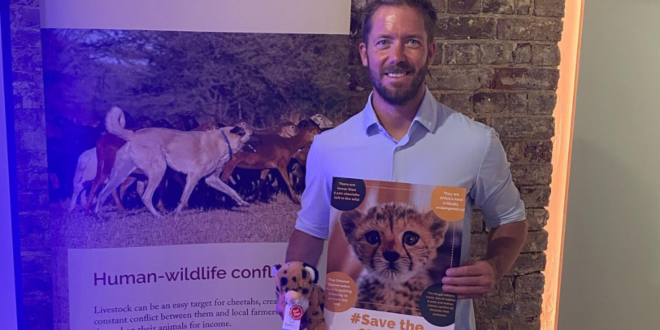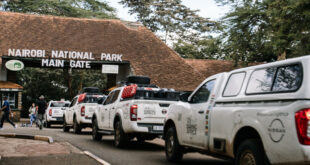

Formula E driver Sam Bird has become an ambassador for a Namibian organisation focused on cheetah conservation.
Bird, a driver for NEOM McLaren Formula E Team, has partnered with the United Kingdom branch of the Cheetah Conservation Fund (CCF), an NGO that’s “working to save the cheetah and its ecosystem”, according to their website.
The racing star, who won the São Paulo E-Prix this past weekend, has launched a campaign called “Racing for Survival”, which will see him run at special events and locations, throughout 2024. He has pledged to donate £1 for every 1 km he runs. The money he raises will go towards the CCF’s efforts to protect and raise awareness for the world’s fastest land animal.
The CCF is based near Otjiwarongo, Namibia, and was founded in 1990 by Dr. Laurie Marker. Marker, a zoologist and researcher, first worked with cheetahs at a wildlife park in the United States before moving to Namibia to start the CCF to help protect the species’ future by mitigating the problem of the farmer-cheetah conflict.
Marker said, “We are so grateful to have Sam on board as an Ambassador for the Cheetah Conservation Fund in the UK. It’s a real boost to raising vital awareness and funds for this unique and special animal. The synergy between the Cheetah’s adaption for speed and agility and Sam’s skill behind the wheel of a Formula E car is perfect, and when tied into the series’ aims of reducing air pollution and championing the fight against climate change makes this a powerful partnership to help the cheetah win its #raceforsurvival.”
Speaking about his involvement with the CCF, Bird said: “When I learnt about the CCF, what they were trying to achieve and what they needed to do, it became a straightforward opportunity for me to get involved in something I absolutely adore; which is wildlife. The CCF is working hard to save a species that many people do not realise is on the endangered list. Cheetahs are getting killed in the wild at quite an alarming rate, and we need to protect them. I am super proud and happy to work with the individuals working to save the cheetah.”
Bird said that being a racer made him even more fascinated with cheetahs and left him with a desire to use his public platform to promote cheetah conservation.
“I love speed and speed fascinates me. Working with an animal with raw speed that is genetically built to be a rocket ship in a straight line, made the decision to work with the CCF extremely easy,” stated Bird.
Cheetahs can reach speeds of 60mph in three seconds, a time only half a second slower than a recent acceleration record set in a Formula E car. (In the lead-up to International Women’s Day, Saudi driver Reem Al Aboud achieved a 0-60mph time of 2.49 seconds in a Formula E GENBETA car.)
A threatened existence
Cheetahs are the most endangered big cat in Africa and their numbers have dropped by 98%, leaving around 7,000 in the wild in Africa. Their biggest threat is humans, as they are often hunted by farmers and by people looking to sell them in the illegal wildlife pet trade.
The CCF is focused on providing a sanctuary for cheetahs, conducting research on cheetahs, promoting cheetah conservation and educating farmers and the general public on the animal.
According to The CCF’s website, “The CCF works to develop best practices that benefit the entire ecosystem upon which the cheetah depends. [The] CCF’s programs address the concerns for wildlife populations and the human communities that share the landscape”.
The organisation aims to manage the problem of cheetahs being killed by farmers due to their threat to livestock. The CCF does this through education, livestock protection, developing wildlife conservancies and providing alternative revenue streams by upskilling locals.
“It’s often not even cheetahs that attack livestock, but rather other animals. However, cheetahs get a bad reputation, as they are believed to be responsible for this, and they suffer as a result,” explains Bird.
.
 ..:: AUTO REPORT AFRICA ::..
..:: AUTO REPORT AFRICA ::..




